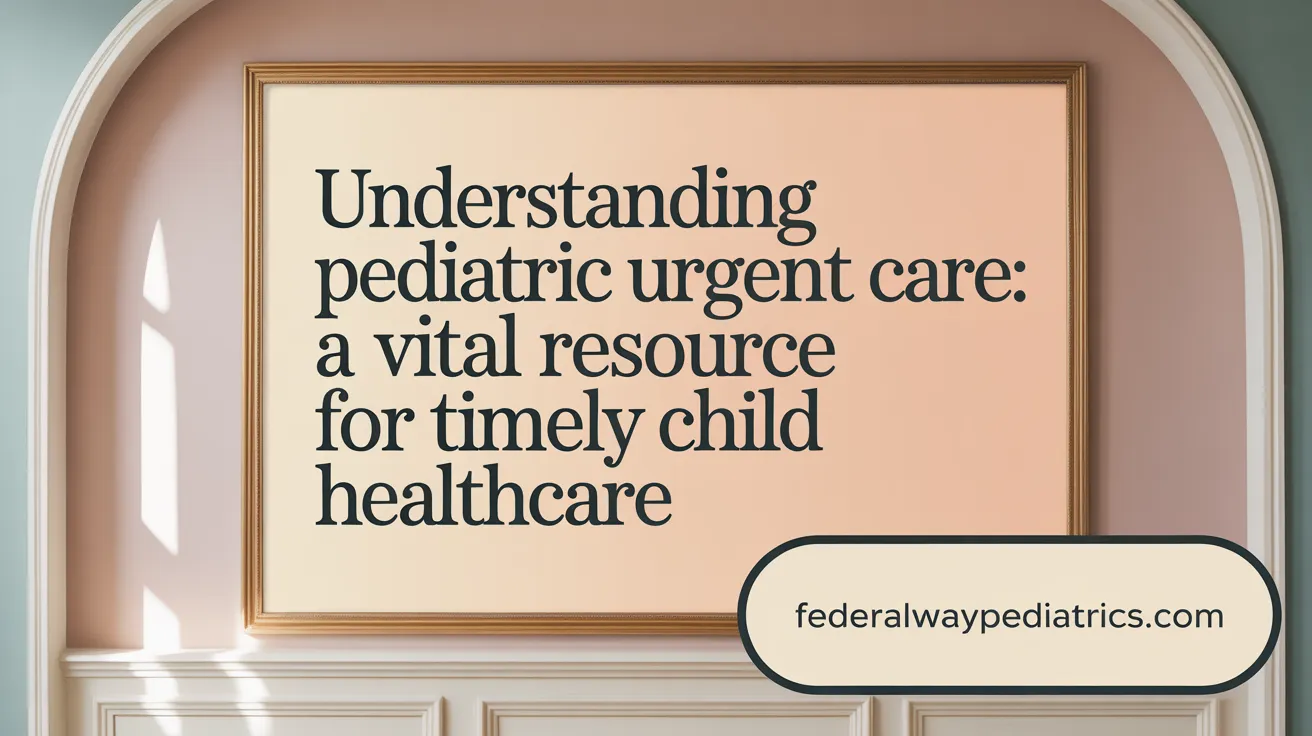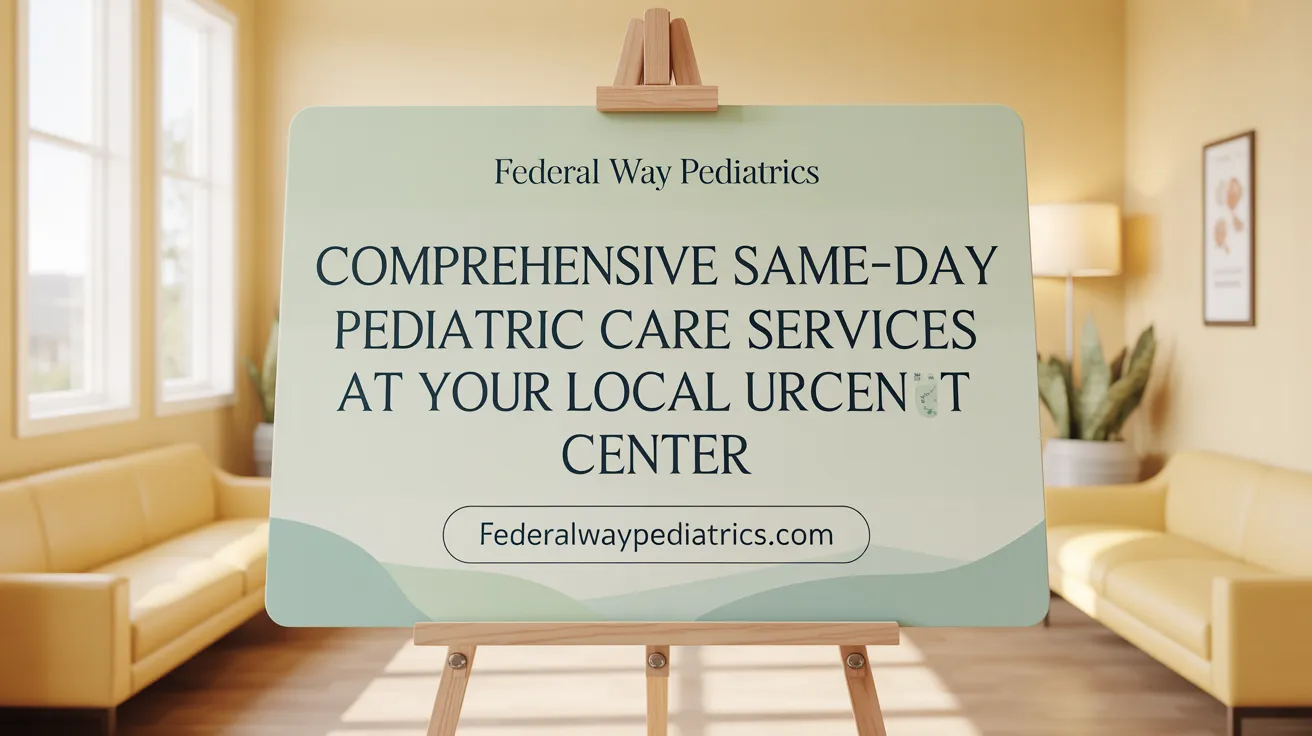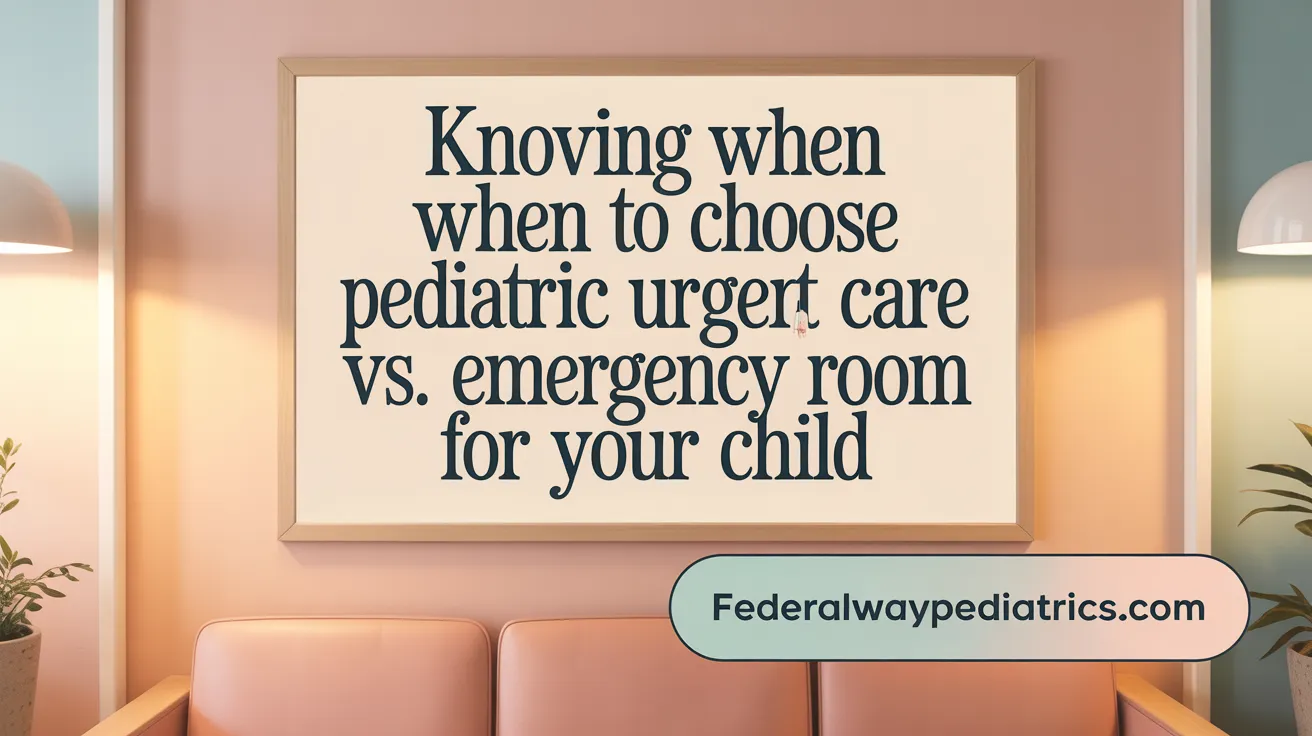The Importance of Immediate Pediatric Healthcare
When children fall ill or sustain injuries, parents seek quick, expert medical attention tailored to the unique needs of their kids. Same-day pediatric urgent care centers provide this crucial care, addressing non-life-threatening but urgent health concerns with speed and specialized expertise. This article explores how these centers operate, the benefits they offer over emergency rooms or general urgent care, and practical guidance for parents navigating medical decisions for their children.
What is Pediatric Urgent Care and Why Does It Matter?

What distinguishes pediatric urgent care from emergency care and primary care?
Pediatric urgent care centers specialize in providing fast, immediate treatment for children with non-life-threatening illnesses and minor injuries that need quick attention but do not require emergency room services. These centers operate during after-hours or weekends when a child's regular pediatrician might be unavailable. In contrast, emergency departments focus on severe and life-threatening situations like seizures, unconsciousness, or serious head trauma.
Primary care handles ongoing health needs such as routine checkups, vaccinations, and chronic disease management. Pediatric urgent care fills the gap between primary care and emergency rooms by treating urgent but less critical issues efficiently.
What types of illnesses and injuries do pediatric urgent care centers commonly treat?
Pediatric urgent care clinics usually handle a range of common ailments and injuries including:
- Colds, flu, and fevers
- Ear infections and sore throats
- Minor cuts, scrapes, burns, and bruises
- Sprains and minor fractures
- Rashes and skin infections
- Mild allergic reactions and dehydration
- Vomiting and diarrhea
These centers offer diagnostic services such as rapid testing for influenza and strep throat, on-site X-rays for fractures, and laboratory work for infections.
Why is specialized pediatric expertise important?
Children have unique healthcare needs that differ from adults, including different physiology, communication styles, and medication dosages. Staff at pediatric urgent care centers are specifically trained in pediatric medicine, allowing them to provide accurate assessments and treatments tailored for children.
Facilities are equipped with child-sized medical equipment and adopt child-friendly environments designed to reduce anxiety and make visits more comfortable. Pediatric clinicians understand childhood growth and development, ensuring safe medication dosing and appropriate care.
The combination of prompt care, child-focused expertise, and accessible services makes pediatric urgent care a vital resource for families seeking timely treatment for their children's urgent health concerns without the need for emergency hospitalization.
Advantages of Choosing Same-Day Pediatric Urgent Care

What are the advantages of pediatric urgent care centers compared to emergency rooms?
Pediatric urgent care centers provide several benefits over emergency rooms for non-life-threatening conditions. They typically offer much shorter wait times, enabling quicker assessment and treatment of children's illnesses or injuries. These centers are specifically designed for kids, featuring child-sized medical equipment and vibrant, welcoming decor that helps reduce stress and fear. Staff in these centers are specially trained in pediatric care, ensuring treatment is tailored to children's unique medical and emotional needs. Additionally, urgent care visits are usually more affordable than emergency room costs, making them financially accessible for many families. By utilizing pediatric urgent care, families can avoid unnecessary ER visits, reducing children's exposure to more serious infections and the anxiety associated with hospital environments. For more detailed comparisons, see Emergency Room vs Pediatric Urgent Care Center and Urgent Care vs Emergency Care.
How do these centers ensure a comfortable and effective experience for children?
Pediatric urgent care centers prioritize a child-friendly atmosphere to make medical visits as comforting as possible. Exam rooms are equipped with age-appropriate tools, toys, and distractions. Many centers employ staff trained in child life techniques and pediatric pain management to minimize discomfort and anxiety. Facilities often include sensory-friendly and autism-sensitive environments to accommodate children with special needs, promoting inclusivity. This supportive approach helps children feel secure, enabling effective communication and care delivery. Services like Care+ Pediatrics Urgent Care and Cohen Children's Medical Center highlight these family-centered care models.
Specialized pediatric staff and equipment
These centers are staffed by board-certified pediatricians, nurses, and healthcare professionals who understand the distinct physiology and psychology of children. Dedicated pediatric equipment for examinations and diagnostics, such as low-radiation X-ray machines, ensure accuracy and safety. Many clinics provide onsite digital X-rays, EKGs, and laboratory facilities tailored for pediatric care.
Cost and accessibility benefits
In addition to lower costs compared to emergency rooms, pediatric urgent care centers often accept a wide range of insurance plans including Medicaid and offer financial flexibility. They provide convenient locations and extended hours, including evenings and weekends, allowing timely medical attention without long waits or travel to hospitals. Virtual care options further enhance accessibility, as offered by Virtual Pediatric Care and NYU Langone Virtual Urgent Care.
| Benefit Category | Details | Impact on Families |
|---|---|---|
| Shorter Wait Times | Rapid treatment for non-emergencies | Less stress, quicker relief |
| Child-Friendly Environment | Playful decor, toys, sensory-friendly spaces | Reduced anxiety and better cooperation |
| Specialized Pediatric Staff | Pediatric-trained physicians and nurses | Tailored, expert care specific to children |
| Pediatric Equipment | Child-sized tools, low-radiation diagnostic machines | Safer, more precise examinations |
| Cost Efficiency | Lower fees than ER visits, wider insurance acceptance | More affordable healthcare access |
| Accessibility | Extended hours, multiple locations, virtual options | Greater convenience and care availability |
Scope of Services: What Pediatric Urgent Care Can Handle Same-Day

What medical services and diagnostics are available at pediatric urgent care?
Pediatric urgent care centers handle a broad range of medical issues including fevers, colds, ear infections, flu-like symptoms, minor injuries such as cuts, sprains, and burns, as well as skin rashes and dehydration. These centers are equipped with on-site diagnostic facilities to quickly evaluate and treat conditions. Common diagnostics include rapid lab testing for influenza, strep throat, RSV, and COVID-19. Digital X-rays, specifically tailored for children to reduce radiation exposure, EKGs, and lab services for blood and urine tests are also available. Additionally, centers provide IV therapy, wound care including laceration repair with stitches or staples, and prescribe medications when appropriate. For more on common pediatric urgent care illnesses and diagnostics, and benefits of pediatric urgent care services, see those resources.
What virtual care options do pediatric urgent care centers provide?
Many pediatric urgent care centers offer virtual pediatric urgent care appointments that allow parents to consult healthcare providers remotely. Virtual visits can manage a range of illnesses such as allergies, fevers, coughs, rashes, vomiting, and diarrhea, offering convenience and reducing exposure to other illnesses. These telehealth services are typically available beyond regular clinic hours including nights and weekends, facilitating quick access and follow-up care without the need for in-person visits. More benefits and availability of virtual pediatric urgent care are highlighted in expert advice.
Are mental health urgent care services part of pediatric urgent care?
Yes, a growing number of pediatric urgent care centers integrate pediatric behavioral health urgent care services. These specialized clinics provide same-day, walk-in access to mental health care for children and adolescents facing issues such as anxiety, depression, behavioral crises, or suicidal thoughts. By offering in-person and virtual options, these facilities serve as an alternative to emergency room visits, aiming to reduce wait times and provide immediate, compassionate care in a child-friendly setting. This integration helps address urgent mental health needs effectively while supporting overall pediatric health. For detailed information, see Pediatric Behavioral Health Urgent Care services and benefits of mental health urgent care centers.
When to Opt for Pediatric Urgent Care Versus Emergency Room

What signs indicate a child requires emergency room care instead of urgent care?
Children need emergency room attention when facing severe or life-threatening symptoms. These include difficulty breathing, seizures, unconsciousness, and high fever in infants under 2 months. Serious head injuries, suspected poisoning or ingestion of dangerous items like batteries, severe burns, and uncontrolled bleeding also require immediate ER visits. Additionally, severe allergic reactions accompanied by breathing difficulty or swelling call for emergency services. These symptoms indicate critical conditions where specialized Pediatric Emergency Care NYC and equipment are essential.
When is pediatric urgent care the appropriate choice?
Pediatric urgent care is best suited for less critical but urgent health concerns. These include fevers in children older than 2 months, minor injuries such as sprains and small cuts, ear infections, and mild dehydration. It also covers treatment for minor burns, rashes, vomiting without signs of dehydration, colds, and flu-like symptoms. Urgent care centers provide quick, child-centered medical attention for these common pediatric issues, often outside regular office hours.
How should parents decide between urgent care and emergency room visits?
Parents should monitor symptoms closely and assess their severity. For uncertain cases, contacting the child's pediatrician can provide guidance. If symptoms suggest immediate danger like difficulty breathing or unconsciousness, head straight to the emergency room. For less severe ailments needing prompt attention, pediatric urgent care offers accessible and specialized services. Knowing these distinctions helps avoid unnecessary ER visits while ensuring children get timely care.
Why is consulting a pediatrician important?
Pediatricians play a vital role in directing care decisions. They understand your child's medical history and can help differentiate between conditions requiring urgent or emergency care. Early consultation offers reassurance, reduces stress, and ensures proper management of symptoms. Pediatricians also coordinate follow-up care, fostering continuity and comprehensive treatment, as highlighted by resources on Pediatric Urgent Care Benefits and Services.
Practical Tips for Parents Seeking Same-Day Pediatric Urgent Care

How can parents prepare for a pediatric urgent care visit?
Parents should come prepared with a list of their child's symptoms and any current medications. Bringing relevant medical history helps pediatric urgent care providers offer prompt, effective treatment. It's also helpful to bring comfort items, such as a favorite toy or blanket, to ease the child's anxiety during the visit. Understanding differences between pediatric urgent care and emergency care can save time and provide the appropriate level of treatment. Many pediatric urgent care centers offer flexible scheduling with options for walk-in visits or online appointment booking, making urgent care accessible when families need it.
Why is timely medical attention important?
Seeking Same-Day Sick Visits ensures children receive prompt evaluation and treatment, reducing the risk of complications. Early care can prevent minor conditions from worsening and alleviate discomfort more quickly. Pediatric urgent care centers are staffed by specialists trained specifically in children's health, ensuring the care is tailored to a child's unique needs.
What role do home remedies play alongside urgent care?
While home remedies like keeping a child well-hydrated, ensuring plenty of rest, using acetaminophen or ibuprofen to reduce fever, and saline nasal sprays for congestion can ease many common symptoms, these should complement—not replace—professional medical evaluation. Safe ways to soothe sick babies and kids include benefits of honey to soothe a sore throat and reduce coughing in children over 1 year old. Parents should monitor their child closely and seek same-day pediatric urgent care if symptoms persist, worsen, or if the child shows signs of dehydration or distress.
What are important insurance and accessibility considerations?
Many pediatric urgent care providers accept most major insurance plans and Medicaid, making care financially accessible. Practices often have multiple locations and offer 24/7 medical guidance alongside online scheduling to support families efficiently. Checking insurance acceptance and scheduling options before visiting can streamline the process and reduce stress during urgent situations.
Ensuring Prompt and Specialized Care for Children's Health
Same-day pediatric urgent care centers provide invaluable access to specialized, compassionate, and efficient healthcare that addresses the unique needs of children. By understanding when and how to utilize these services, parents can ensure their children receive prompt relief from common illnesses and injuries while avoiding unnecessary emergency room visits. Coupled with appropriate home care and professional guidance, pediatric urgent care is a vital resource for safeguarding children's health and wellbeing.
